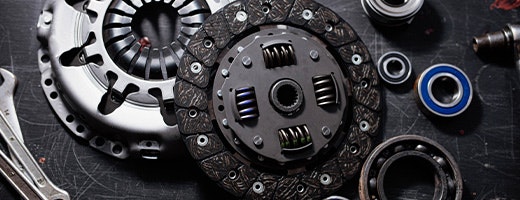
What's grinding your gears?
Clutch issues may be caused from a broken flywheel, faulty clutch plate or leaky hoses.
Read moreDiscover the importance of frequent inspection, repairs, and replacements of brake components and clutch assembly. Safeguard your well-being with expert car service for a smooth ride.
The clutch is one of the most important elements of your vehicles driving operation. Your engine is what causes your wheels to rotate, but what happens when your vehicle needs to stop? The engine shouldn't stop spinning but the wheels need to. It's the clutch that permits this to happen.
The clutch allows the transfer of power between the wheels and the engine to be interrupted while a gear is being changed or while the car is stationary and the engine continues to run.

Some vehicles have hydraulic clutches - when you press the clutch pedal the clutch fluid moves the pressure from the pedal through to the clutch and disengages the power transmission. Leaking clutch fluid can cause all kinds of problem in your vehicle so it is very important to monitor it regularly. At Kinnane's Car Clinic we check your clutch fluid, hydraulic system or clutch cables for you as part of our free 65 Point Vehicle Inspection Report - which you can request as part of every car service.
If we discover a problem or leak in your clutch we will include this in our written report or let you know directly if we feel it needs immediate attention.
You should have your clutch looked at if:
If your clutch is showing any of the problems above - it can mean any number of faults. Clutch problems are difficult to diagnose by symptoms alone because many issues cause the same symptoms, depending on the vehicle and type of engine.
The best way to deal with clutch shuddering, slipping or noise is call us at Kinnane's Car Clinic or book online today. We can perform Clutch service and repairs on most makes and models right here in our West Ipswich workshop.


Clutch issues may be caused from a broken flywheel, faulty clutch plate or leaky hoses.
Read more
The constant velocity joint, or CV joint, connects your transmission to your wheels. Contact Kinnane's Car Clinic for all suspension inspection and repairs.
Read more
Your car's safety and roadworthiness is dependent on the vehicle's ‘stopping, steering and stability' capabilities. Let Kinnane's Car Clinic inspect your vehicle and provide you with a Condition Report.
Read more